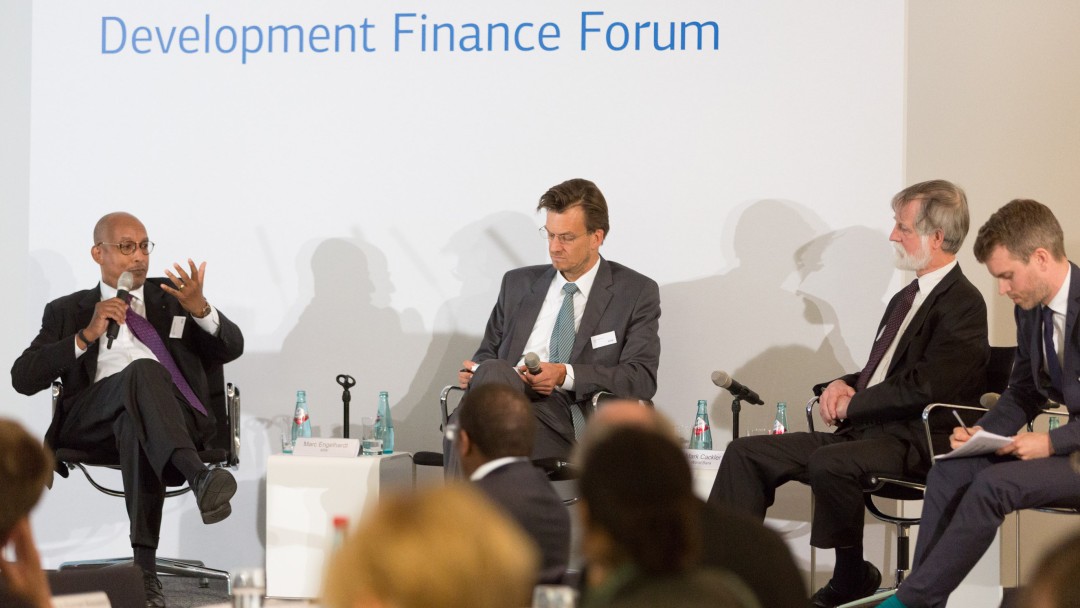News from 2015-07-22 / KfW Development Bank
Diet - too little and not enough variety
First ever "DFF" event on hunger and food supply security
Despite a marked improvement in the last 20 years, there are still 800 million people without enough food in the world today. Another two million do not have enough variety in their diet, suffering from what is referred to as "hidden hunger". The question of the best way for the world to eradicate hunger and what role development banks could play in this process was the subject of a two-day conference hosted by KfW in early July, with a number of high-profile attendees. The event also marked the start of a new series of "Development Finance Forum" events, which KfW will use in the future to offer a Frankfurt-based platform for a regular international dialogue on current development policy issues. More than 120 international experts discussed the opportunities and challenges on the path towards a world in which everyone has enough to eat (and also enough variety in their diet), and did so for the first time from the perspective of various specialist fields, from agriculture to the financial and health sectors.
At the very start of the event, Christiane Hieronymus (representing the German Federal Ministry for Economic Cooperation and Development or BMZ) underscored the fact that the fight against hunger is a top priority for the current German federal government. She reported that the BMZ invests about a fifth of its budget in projects and programmes aimed at achieving "a world without hunger". This, according to the Departmental Head, is because "Hunger is a scandal that can be prevented".

More intensive production, more varied diets
In his keynote address, Professor Matin Qaim from the University of Göttingen drew attention to the fact that combating hunger above all requires a balanced diet and not simply more calories. Food is being produced in sufficient quantities. But it would be wrong to conclude from this that hunger and malnutrition are simply a problem of proper distribution.
That is why, according to Qaim, it is necessary to take a look at the quality of people's diets while also improving agricultural productivity. This requires increased investment in agriculture, a heightened awareness of malnutrition and its causes, greater support for smallholders, improved access to markets and more intensive research in order to gain a better understanding of the connections between agriculture and diet. Women should also be given greater power to make decisions regarding income and spending for family and company budgets.
Capital as an important prerequisite
The participants in various panel discussions also agreed that appropriate models of financing are required. These include short-term loans, for example for seeds and fertilisers, but also loans with longer terms for expenses such as machinery, irrigation or the renewal of plantations.
In Africa in particular, the challenge is to finance small agricultural operations, for example by means of equity investments and long-term, low-interest forms of finance ("patient capital"). Keith Palmer from the British non-profit organisation AgDevCo referred to the example of Mozambique, where maize farmers have been able to achieve a lasting improvement in their yields and income. This involved following an integrated approach to value creation that opened up new sales markets for farmers in addition to providing loans.
In response to the question of how agriculture should be subsidised, Cornell University Professor Calum Turvey presented new approaches that do not distort markets. Suitable approaches include indirect methods, for example, in which smallholders receive credit-linked, premium-free insurance that makes it possible to grant a loan in the first place. One conclusion drawn at the event was that development banks could also increase their involvement in these kinds of solutions in order to mitigate risks and pave the way for private investors.
Changing habits
A further round of discussion touched on the habits standing in the way of healthy nutrition. The lives of around 800,000 children could be saved each year if their mothers breast-fed them in their first six months and the mothers themselves had a more varied diet during pregnancy, reported Shawn Baker of the Gates Foundation. He went on to say that it was important to ensure that children were given more vitamins and trace elements in their first 1,000 days as this phase had a crucial bearing on their further physical and mental development. According to studies, intensive education campaigns via mass media combined with a personal approach, e.g. involving health counsellors, offer the best means of changing such habits.
At the end of the conference, Tom Arnold of "Scaling up Nutrition" drew the following conclusion: "It's not merely a question of food but more particularly of nutrition." He added that other key issues were clean water, information and education particularly for women, infrastructure, research and suitable finance. In order to tackle hunger in all its dimensions, "we therefore need a sensible mix of different measures" - and to share information across different disciplines in the way that the first DFF has made possible.


Share page
To share the content of this page with your network, click on one of the icons below.
Note on data protection: When you share content, your personal data is transferred to the selected network.
Data protection
Alternatively, you can also copy the short link: https://www.kfw-entwicklungsbank.de/s/enzBWrMC.BHFA
Copy link Link copied